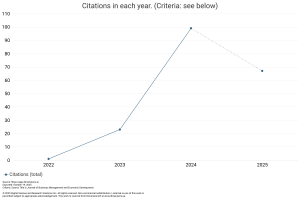Exploring the relationship between manager profile and management control: Evidence from Moroccan Manufacturing Companies
DOI:
https://doi.org/10.59653/jbmed.v2i03.1088Keywords:
Manager profile, Behavioral contingency factors, Manager age, Manager experience, Manager training, Management control, Moroccan manufacturing companiesAbstract
This study examines the impact of managerial profile on management control in Moroccan manufacturing companies, using a method of analysis based on correlation and multivariate regression. The independent variables include the manager's age, experience and training, while management control is considered the dependent variable. By exploring these relationships, the study aims to identify the specific influences of managers' individual traits on the design and implementation of management control systems in this particular context. The expected results will contribute to enriching strategic management practices by providing valuable insights for practitioners and researchers interested in corporate governance and organizational performance.
Downloads
References
Barker, V. L., & Mueller, G. C. (2002). CEO characteristics and firm R&D spending. Management Science, 48(6), 782-801.
Barney, J. B., & Hesterly, W. S. (2006). Strategic management and competitive advantage: Concepts and cases. Pearson Prentice Hall.
Campbell, T. L., & Mínguez-Vera, A. (2022). CEO Personality and Firm Performance: A Meta-Analysis. Strategic Management Journal, 43(12), 2313-2336.
Finkelstein, S., & Hambrick, D. C. (1996). Strategic leadership: Top executives and their effects on organizations. West Publishing Company.
Finkelstein, S., & Hambrick, D. C. (1996). Strategic leadership: Top executives and their effects on organizations. West Publishing Company.
Govindarajan, V., & Gupta, A. K. (1985). Linking control systems to business unit strategy: Impact on performance. Accounting, Organizations and Society, 10(1), 51-66.
Gupta, A. K., Smith, K. G., & Shalley, C. E. (2006). The interplay between exploration and exploitation. Academy of Management Journal, 49(4), 693-706.
Hitt, M. A., Ireland, R. D., & Hoskisson, R. E. (2012). Strategic management: Competitiveness and globalization. Cengage Learning.
Langfield-Smith, K. (1997). Management control systems and strategy: A critical review. Accounting, Organizations and Society, 22(2), 207-232.
Merchant, K. A., & Van der Stede, W. A. (2017). "Management Control Systems: Performance Measurement, Evaluation and Incentives" (4th ed.). Pearson Education.
Ojra, J. (2014). Strategic management accounting practices in Palestinian companies: application of contingency theory perspective. Doctoral dissertation, University of East Anglia, Norwich, United Kingdom.
Otley, D. (1980). The contingency theory of management accounting: Achievement and prognosis. Accounting, Organizations and Society, 5(4), 413-428.
Otley, D. (2016). The contingency theory of management accounting and control: 1980-2014. Management Accounting Research, 31, 45-62.
Otley, D. T. (1980). The contingency theory of management accounting: Achievement and prognosis. Readings in Accounting for Management Control, 83-106.
Pham, D. H., Dao, T. H., & Bui, T. D. (2020). The Impact of contingency factors on management accounting practices in Vietnam. The Journal of Asian Finance, Economics & Business, 7(8), 77-85.
Simons, R. (1995). Levers of Control: How Managers Use Innovative Control Systems to Drive Strategic Renewal. Harvard Business Review Press.
Downloads
Published
How to Cite
Issue
Section
License
Copyright (c) 2024 Hind Hammouch

This work is licensed under a Creative Commons Attribution-ShareAlike 4.0 International License.
Authors who publish with this journal agree to the following terms:
- Authors retain copyright and grant the journal right of first publication with the work simultaneously licensed under a Creative Commons Attribution-ShareAlike that allows others to share the work with an acknowledgement of the work's authorship and initial publication in this journal.
- Authors are able to enter into separate, additional contractual arrangements for the non-exclusive distribution of the journal's published version of the work (e.g., post it to an institutional repository or publish it in a book), with an acknowledgement of its initial publication in this journal.
- Authors are permitted and encouraged to post their work online (e.g., in institutional repositories or on their website) prior to and during the submission process, as it can lead to productive exchanges, as well as earlier and greater citation of published work (See The Effect of Open Access).





























